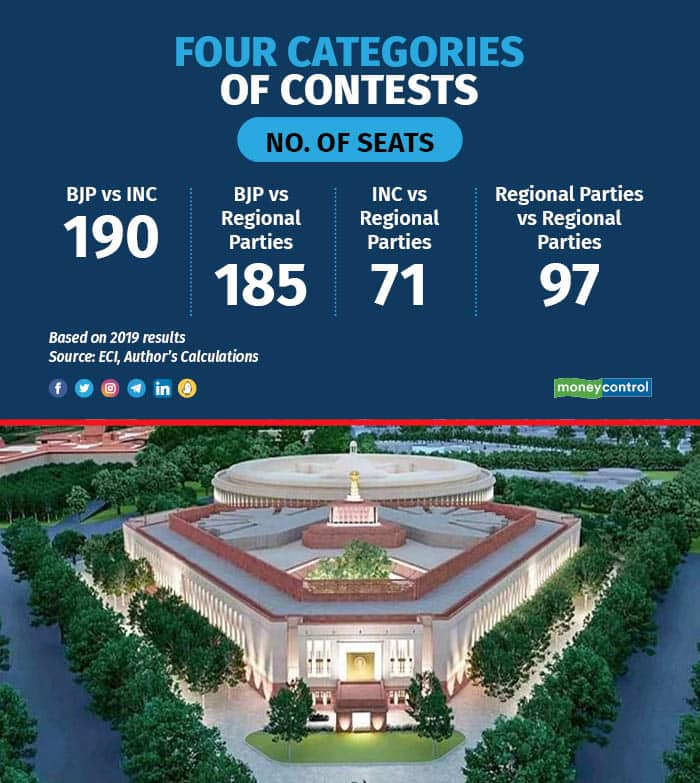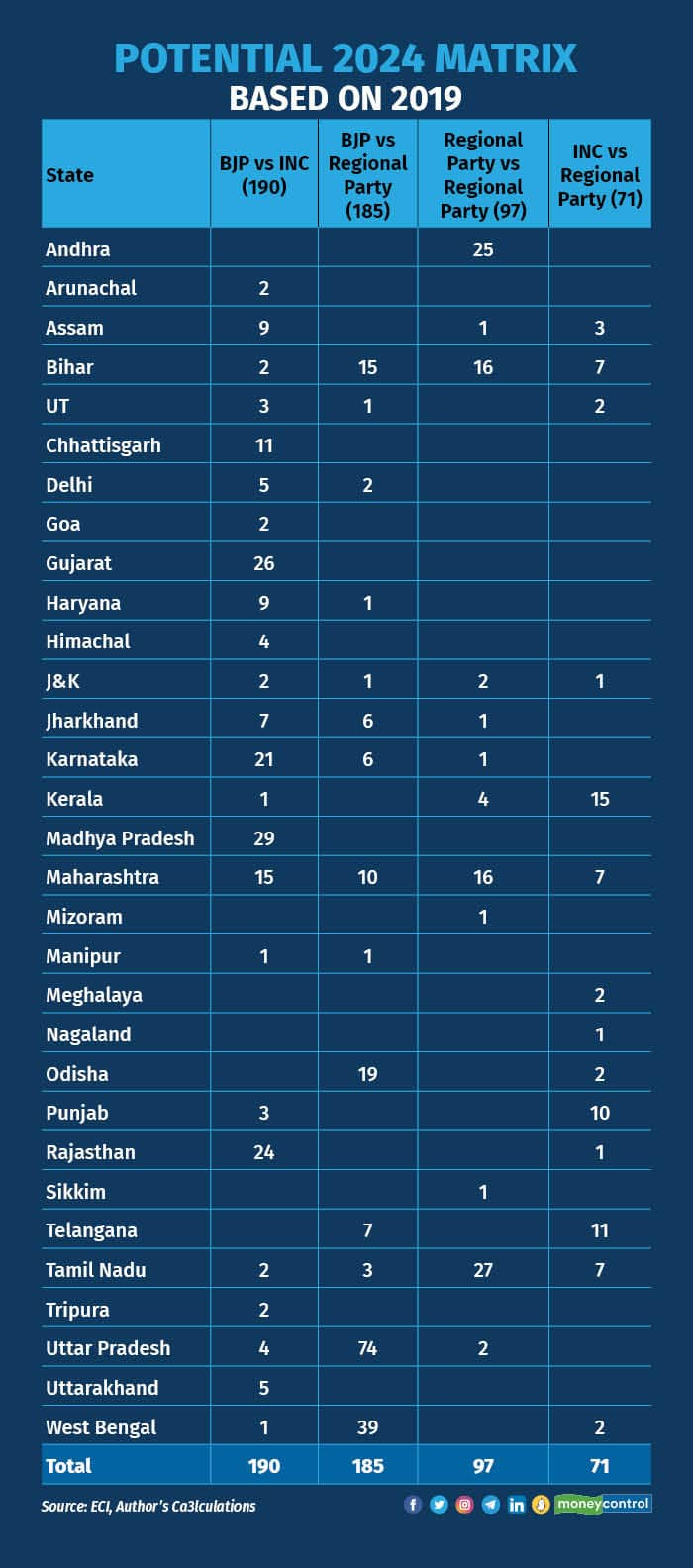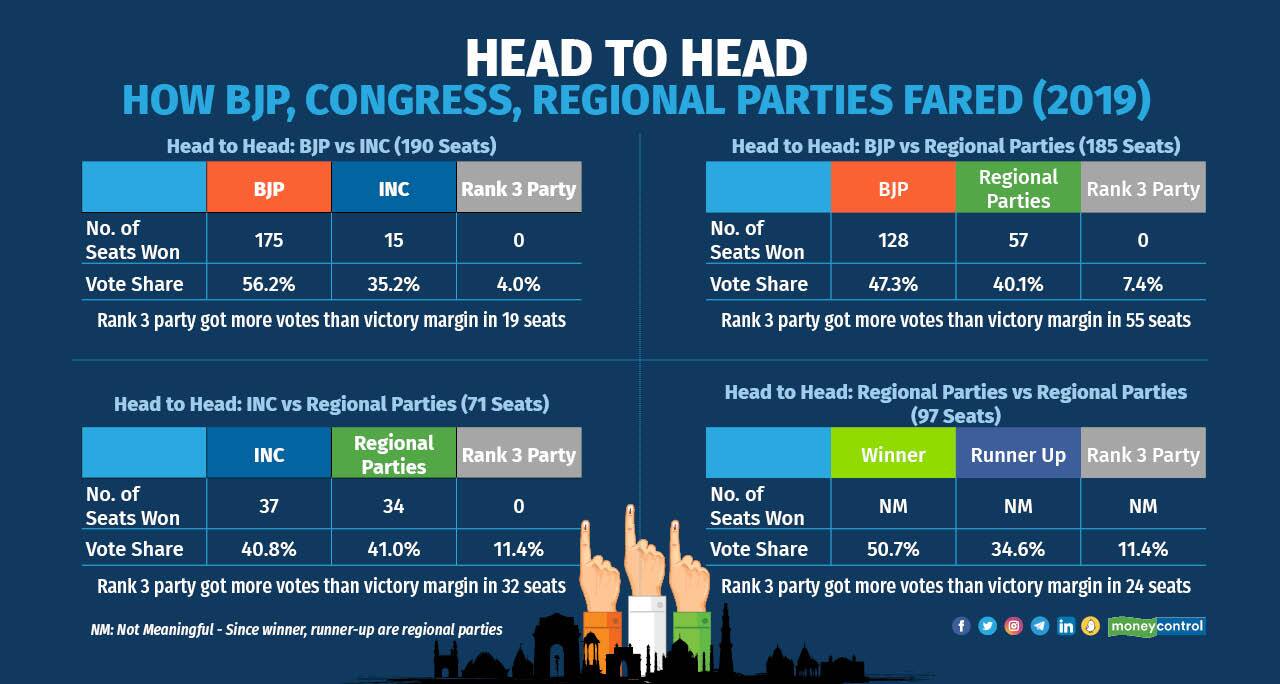



The chess board for the grand finale in 2024 is set. The opposition is making efforts to pose a united challenge to the Bharatiya Janata Party. A grand opposition meeting is scheduled on June 23 in Patna. While unity is fine but tedious, the focus of opposition leaders on a common manifesto and their blueprint for New India is presently too little, and shouldn’t be too late.
How is their vision different from the current ruling dispensation? How are they going to solve the issues which they are blaming the BJP for addressing inadequately? These are some of the pertinent questions they need to answer to win the trust of people and emerge as a credible alternative.
543 Seats, Four Permutations
If we assume that the chessboard pieces are already in place, there are four categories of contests likely in 2024 based on the 2019 results.

The state-wise breakup of seats shows that the highest number of Congress (INC) versus BJP head-to-head contests are in Madhya Pradesh, Gujarat, Rajasthan and Karnataka. The highest number of BJP versus Regional parties head-to-head contests are in Uttar Pradesh, Bengal and Odisha.
The highest number of Regional Parties vs Regional Parties head-to-head contests are in Tamil Nadu, Andhra, Maharashtra and Bihar. The highest number of Congress versus Regional parties head-to-head contests are in Telangana, Kerala and Punjab.

Four Pathways To 272
BJP vs INC (190 seats): Out of these 190 seats, regional players have limited or no role in 136 seats spread out in Madhya Pradesh, Chhattisgarh, Himachal Pradesh, Uttarakhand, Delhi, Gujarat, Rajasthan, Assam etc. On 19 seats, the second runner up scored more than margin of victory, 13 of these were won by the BJP.
BJP vs Regional parties (185 seats): Out of these 185 seats, Congress has limited or no role in 128 seats spread out in Uttar Pradesh, West Bengal, Bihar, Odisha etc. Congress was second runner up in 88 such seats. On 55 seats, the second runner up scored more than the margin of victory. 35 of these were won by the BJP.
INC vs Regional parties (71 seats): Out of these 71 seats, opposition unity is not possible in 36 seats. These are situated in Punjab, Telangana and Kerala. On 32 seats, the second runner up scored more than margin of victory, 21 of these were won by the Congress.
Regional vs Regional (97 seats): Of 97 seats, in 59 BJP and Congress have alliances in place in Tamil Nadu, Bihar and Maharashtra. As JD(U) has moved out of NDA, some of their seats (17) could be contested by the BJP this time, and hence they could move from Regional parties versus Regional parties category to BJP versus Regional parties contests in 2024. On 24 of 97 seats, the third player scored more than the margin of victory.

Third Player, A Vote Cutter? On 130 seats out of 543, the third ranked candidate recorded more votes than margin of victory. Out of these, the BJP won only 48, Regional parties 55 and Congress 27 seats. A split of votes didn’t help the BJP alone but all parties.
The 2024 Fight In 375 Seats
The chessboard for 2024 is set: There are 375 key battleground seats. In them, BJP will fight against INC on 190 seats and regional parties in 185.
INC has to beat BJP on its own in 90 percent of the 190 seat as only on 10 percent of the seats the third party played the role of spoiler. Similarly the regional parties have to beat BJP on their own in more than 70 percent of these head-to-head seats. On 55 seats some sort of understanding will help opposition parties.
INC will contest against regional parties on 36 seats, largely in Telangana and Kerala, and need to beat them to maintain/improve its tally. Non-aligned regional parties will contest against each other on 38-odd seats, largely in Andhra.
While the opposition is likely to discuss the “one-seat one-candidate” formula of Nitish Kumar at the June 23 meeting, NDA has also started shopping for allies. Reports suggest it could re-induct allies like SBSP (UP), JD(S) (Karnataka) and TDP (Andhra) after the high-profile exits of JD(U), Akali Dal and Shiv Sena (Uddhav faction).
Opposition parties while trying to repeat the 1977 experiment should remember that it was short-lived. For a chance at success in elections and in government, the budding “alliance” needs a common minimum programme. Just seat sharing won’t help.
Amitabh Tiwari is a former corporate and investment banker-turned political strategist and commentator. Twitter: @politicalbaaba. Views are personal, and do not represent the stand of this publication.
Discover the latest Business News, Sensex, and Nifty updates. Obtain Personal Finance insights, tax queries, and expert opinions on Moneycontrol or download the Moneycontrol App to stay updated!